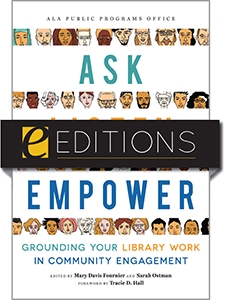
Primary tabs
You don't need to be an ALA Member to purchase from the ALA Store, but you'll be asked to create an online account/profile during checkout to proceed. This Web Account is for both Members and non-Members. Note that your ALA Member discount will be applied at the final step of the checkout process.
If you are Tax-Exempt, please verify that your account is currently set up as exempt before placing your order, as our new fulfillment center will need current documentation. Learn how to verify here.
- Description
- Table of Contents
- About the authors
- Reviews
“Never has it been more important for libraries to be the hearts of their communities, and for communities to be active constituents in their library’s ecosystem. Ask, Listen, and Empower encourages those new to community engagement to get actively involved by centering, listening to, and building and partnering with their communities. And even those familiar with this work will come away with new ideas and inspiration for building and maintaining community trust, and remaining proactive in their ideas and services. Ask, Listen, and Empower takes community engagement work to the next level.”
— Nicole A. Cooke
Foreword by Tracie D. Hall
Community engagement isn’t simply an important component of a successful library—it’s the foundation upon which every service, offering, and initiative rests. Working collaboratively with community members—be they library customers, residents, faculty, students or partner organizations— ensures that the library works, period. This important resource from ALA’s Public Programs Office (PPO) provides targeted guidance on how libraries can effectively engage with the public to address a range of issues for the betterment of their community, whether it is a city, neighborhood, campus, or something else. Featuring contributions by leaders active in library-led community engagement, it’s designed to be equally useful as a teaching text for LIS students and a go-to handbook for current programming, adult services, and outreach library staff. Balancing practical tools with case studies and stories from field, this collection explores such key topics as
- why libraries belong in the community engagement realm;
- getting the support of board and staff;
- how to understand your community;
- the ethics and challenges of engaging often unreached segments of the community;
- identifying and building engaged partnerships;
- collections and community engagement;
- engaged programming; and
- outcome measurement.
Sharing numerous examples of successful change, dialogue and deliberation, and collaborative efforts, this book offers a comprehensive look at community engagement work that can help all libraries reinforce their roles as champions of lifelong learning.
Foreword by Tracie D. Hall
Introduction
Chapter 1 – Democracy, Community and Libraries
Chapter 2 – Empowering Communities: From Public Trust to Impact
Chapter 3 – I’m Listening: Reimagining the Book Club Model
Chapter 4 – Partnering for Greater Impact
Chapter 5 – Respect and Compromise Aid School-City Partnership
Chapter 6 – Ethical and Inclusive Community Engagement
Chapter 7 – Community-Centered Programming: Tools and Techniques
Chapter 8 – Empowering Volunteers to Build Community
Chapter 9 – Culture Shift: The Path to Becoming Community-Centered
Chapter 10 – Civil Rights Center: Community Engagement and Special Collections
Chapter 11 – Strategic Planning through Community Listening
Chapter 12 – Building Public Trust: It Starts with the Individual
Resources
Mary Davis Fournier
Mary Davis Fournier is Deputy Director of the American Library Association's Public Programs Office where she specializes in national partnerships, new project development, and programs support for public, school and academic libraries. An experienced arts administrator and cultural programmer, her past experiences include directing Chicago’s Printers Row Book Fair (now Lit Fest), programming for the Miami Book Fair International. She is active in Chicago’s nonprofit community and currently co-chairs the board of Chicago Women in Philanthropy. She holds a M.Ed. in Education Policy Studies from the University of Illinois at Champaign-Urbana and a B.A. in History and English Literature from the University of Wisconsin – Madison.
Sarah Ostman
Sarah Ostman is the communications manager in the American Library Association’s Public Programs Office, where she serves as editor of ProgrammingLibrarian.org, a web resource for library professionals. Before joining the ALA and the library field in 2014, she spent nearly a decade as a newspaper reporter, editor, and freelance writer. Ostman has an MA in journalism from Columbia College in Chicago and a BA in sociology and theater from Smith College in Massachusetts.
Public Programs Office (PPO)
ALA's Public Programs Office (PPO) empowers libraries to create vibrant hubs of learning, conversation and connection in communities of all types.
"Valuable and insightful ... Library workers and potential community partners will find the book’s many examples of programming, adult services, and outreach useful for moving from dialogue to action.”
— Library Journal
"Readers ... will find the chapters inspiring and the examples of programs useful to their own work in a library or their research on diversity and inclusion in libraries. There is so much rich content for the reader: specific examples, guidelines, rubrics, and stories of success. Individual chapters, and as a collection, it has a lot to offer all of us working toward meaningful, sincere, and long-lasting engagement with the communities in our catchment areas.”
— International Journal of Information, Diversity, & Inclusion
"As Tracie Hall (executive director of ALA) writes in the foreword, community engagement involves the library effectively advocating 'for the community and their interests to bring attention to their strength and struggles” ... Recommended for any library interested in expanding its reach into and servicing its communities.”
— Choice
"A refreshing overview of community engagement for libraries, with a focus on practical case studies and guidelines."
— Journal of the Australian Library and Information Association


